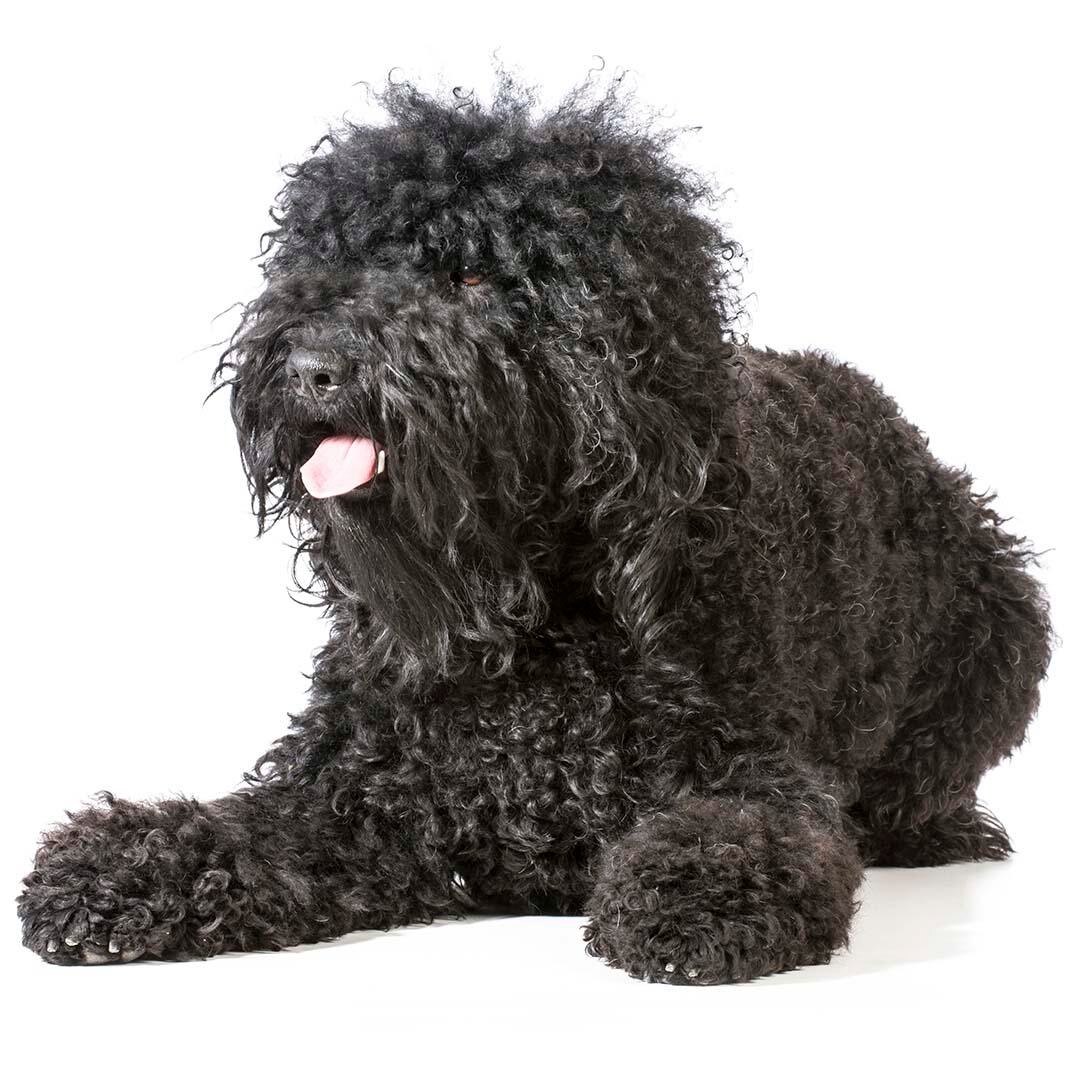
| Family-friendly: | 5/5 |
| Exercise needs: | 3/5 |
| Easy to train: | 4/5 |
| Tolerates being alone: | 1/5 |
| Likes other pets: | 4/5 |
| Energy level: | 5/5 |
| Grooming needs: | 1/5 |
| Shedding: | 2/5 |
The Barbet dog breed can be prone to:
- Progressive retinal atrophy which is an inherited disorder where part of the eye degenerates and wastes away which can result in blindness.
Priority Kennel Club health schemes and testing:
None but there are several recommended schemes that the Kennel Club recommends which can be found here.
Fun loving, eager to work and to please, joyous and occasionally comical, the Barbet is a delight to spend time with and train with, if you enjoy training and gundog type activities. They are something of a mud magnet, and really enjoy active walks, swimming, retrieving from water and so will suit an owner who enjoys training and grooming their dog. Good with children and other animals if socialised and raised correctly, they are friendly and gregarious, so will need regularly training to remind them of polite manners.
| Family-friendly: | 5/5 |
| Exercise needs: | 3/5 |
| Easy to train: | 4/5 |
| Tolerates being alone: | 1/5 |
| Likes other pets: | 4/5 |
| Energy level: | 5/5 |
| Grooming needs: | 1/5 |
| Shedding: | 2/5 |
The Barbet is a medium to large sized gundog, originating in France and also known as the French Water Dog. If you are thinking the Barbet looks like a heavier, more rustic Poodle, you are not wrong. The Barbet is related to the Poodle, in fact for almost a hundred years, the Barbet and the Pudel (the German name for Poodle) were regarded as the same breed!
Their original role was in water retrieval, fetching shot waterfowl from the marshes, wetlands and estuaries of France. Today although the Barbet is rare, they make an engaging and fun companion dog, show dog or working dog.
First brought to the UK in 2001, but not bred here until 2007, they were added to the Kennel Clubs Import Register in 2018 and can be shown in Import Register classes.
The ideal Barbet owner is an outdoorsy person, who likes to walk, is oblivious to rain, mud and cold, and either enjoys grooming or isn’t house-proud! This is a breed that loves to swim, and play gun-dog games, so the optimal owner will enjoy these activities too.
The adult Barbet will enjoy several hours of active walking, perhaps an hour twice a day, with training and games on top of this. As an active and clever gundog, they will enjoy retrieve games and swimming, but take care to limit exercise and jumping in young dogs until their joints are fully formed.
Not particularly demanding on indoor space, although a dedicated space to groom them regularly is important, the Barbet will need a decent sized garden with secure fencing. Ideally a rural or semi-rural home, as they require long daily walks across a variety of ground and particularly enjoy swimming in safe places.
Your dog's diet needs to have the right balance of all the main nutrient groups including a constant supply of fresh water. It's important to conduct regular body condition scores to ensure you keep your dog in ideal shape and remember to feed them at least twice daily and in accordance with the feeding guidelines of their particular food.
The shaggy, curly coat of the Barbet will require frequent grooming, to pick out debris collected on walks and to remove food and saliva from the fur around the mouth and chest. Whilst not traditionally clipped (and never for the show ring) they can be clipped shorter to make this grooming easier, but note that clipping them does not remove the need to groom every few days. Always check eyes, ears and paw pads for foreign matter after walks or play in the garden.
The Barbet will enjoy a variety of doggy activities, from traditional gundog and field trial work to newer sports such as Rally O, Hoopers and much more. This is really a dog for those who adore dog training, and use positive reinforcement methods such as food or toys. They won’t respond well to harsh handling! Focus on early socialisation and particularly a recall, and manners when greeting new people or animals as they can be quite exuberant in their affections and desire to play.
A dog for the active family who enjoy walking, dog training and particularly gundog related activities.
May require more time than families with very small children have to spare, but would be excellent with older children and teenagers who wish to take part in dog sports and competition.
While many dogs are traditionally thought of as being good with children, all dogs and children need to be taught to get on with and respect each other, and be safe together. Even so, dogs and young children should never be left alone together and adults should supervise all interactions between them.